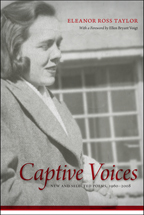Each day leading up to the March 11 announcement of the 2009 NBCC award winners, Critical Mass highlights one of the thirty finalists. Today, NBCC board member Kevin Prufer discusses poetry finalist Eleanor Ross Taylor's Captive Voices: New and Selected Poems, 1960-2008 (LSU Press). Prufer's lengthier review of the book appears in the Colorado Review.
Press). Prufer's lengthier review of the book appears in the Colorado Review.
Like many of our best poets, Eleanor Ross Taylor treads the same ground repeatedly—one might even say, obsessively. If her poems occur in a place, that place is the South. Her speakers are most often mothers and wives thinking about their grown children, the complexities of marriage, and (increasingly in the later poems) their responsibilities to the dead and their own impending demise. Sometimes these voices emerge from an ostensible past, as in “My Grandmother’s Virginhood, 1879” or “Motherhood, 1880.” More often, they take place in an undefined domestic present. Occasionally, they rise from more surprising places, as in “Kitchen Fable,” where the flatware itself takes on the consciousness of a frustrated wife:
He who came down whack.
His conversation, even, edged.
Lying beside him in the drawer
she formed a crazed patina.
The seasons stacked—
melons, succeeded by cured pork.
He dulled; he was a dull knife,
while she was, after all, a fork.
Like one of her literary predecessors, Stevie Smith, Taylor is often terrifically witty and sharp, keen-eyed and quick. The dead, she writes, are “like germs,” growing “more virulent / in slumber, / commanding the pillow / to remember the dream.” In another poem, a housewife calls to us from beneath her back porch, where she’s become trapped while checking the dryer vent. “I think I left the burner on,” she tells us; then, later:
I could have washed these pots
and filled them with rosemary.
Nota bene, my survivors: I’m to be buried
in the old part of the cemetery.
Writing of her own mortality and an impending visit from something resembling Emily Dickinson’s deathly carriage, she asks:
Of course we’ll follow.
Did you say horse? or hearse? No matter
…
What’s triter than hooves’ clatter?
Is dead silence worse?
But it is too, too easy to call her poems “domestic” or “witty” and be done with them, or to notice in the music of her lines those clanging rhymes and shifting rhythms and hear in these mere lightness. The fact is that the sprightly music of her poems serves primarily as a counterpoint against which we’re meant to understand much darker impulses—for running alongside the music are fierce sadness and, frequently, rage. Married life, these poems suggest, is filled with loss and silence. We are always losing track of each other, failing to tell each other what we mean. Our friends and our children die, and so do we. And, though we can make light of all of this—we can, as these poems do appear to sing a happy, witty song about it—we retreat to this music in desperation, to conceal the barely expressible sadness beneath our cheerful melodies. In one of her very finest poems, “Song,” here quoted in full, she adopts the voice of an elderly farmwoman addressing her grandchildren:
Oh my dearie,
Our childhoods are histories,
Buckets at the bottom of the well,
And hard to tell
Whether they will hold water or no.
Did Pa die before we were married?
No, he died in twenty-seven,
But I remember the wedding
Reminded me of the funeral—
When grandbabies ask,
Little do they care,
I will tell them about the man I found
That day at my plowing in the low-grounds
Lying at the edge of the water.
His face had bathed five nights.
A dark man, a foreigner, like.
They never found his kind to tell….
Buckets, buckets at the bottom of the well.
It was in the paper with my name.
I found him.
I have the clipping tells all about it,
If your Grandma aint thrown it out.
Oh my dearie
When our faces are swol up
We will look strange to them.
Nobody, looking out the door
Will think to call us in.
They’ll snap their fingers trying
To recollect our names.
Five nights, five bones, five buckets—
Who’ll ever hear a sound?
Oh my dearie
The rope broke
The bucket bobs round
Oh my dearie
Here, the lightness of the buried rhyme and witty colloquial language serve only to throw into relief the rage of the speaker, who (much to the horror of her listeners, we imagine) grows darker, more morbid, and sadder as the poem progresses, ending in four short, punctuation-free, halting lines, her voice trailing into a silent, hopeless meditation on death and loss.
Last time I checked, this book was ranked somewhere in the millions on Amazon.com’s so-called best seller list. This is a shame. American poets could learn something from Taylor’s dexterous, rhythmic lines, the ambitious irony of her music, and the complexity of the minds at work in these poems. And I cannot imagine the serious reader—poet or not—who could leave Captive Voices unmoved by the work of this supremely gifted poet who skips so nimbly around our sadnesses and fears, never directly addressing them, suggesting, instead, their complex resistance to summary.
Click here for a brief biography of Eleanor Ross Taylor and a bibliography of her work (from Encyclopedia Virginia)


